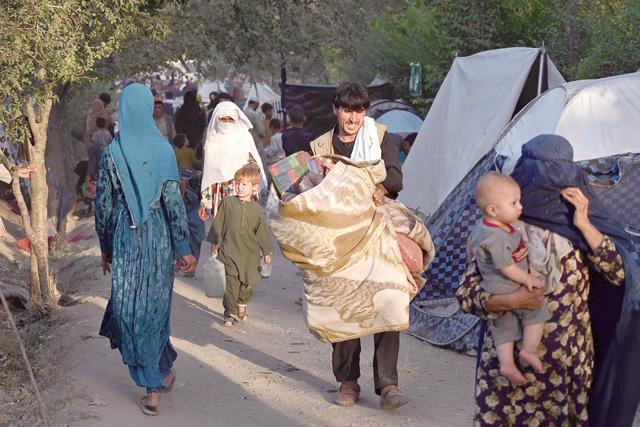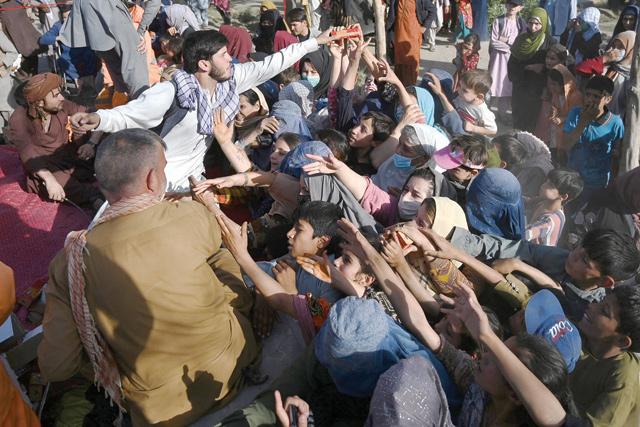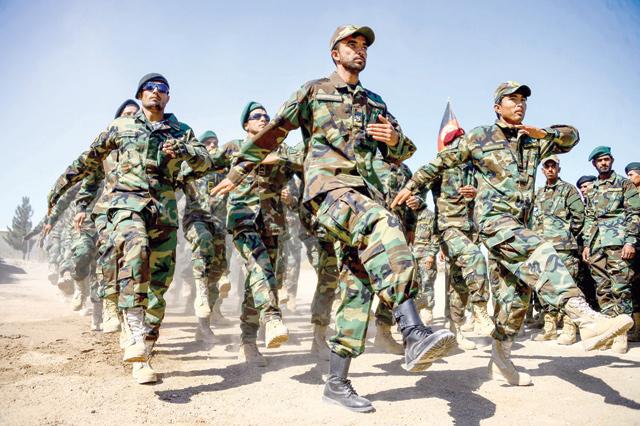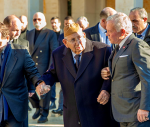You are here
Thousands flee as Taliban eye full control of northern Afghanistan
By AFP - Aug 10,2021 - Last updated at Aug 10,2021
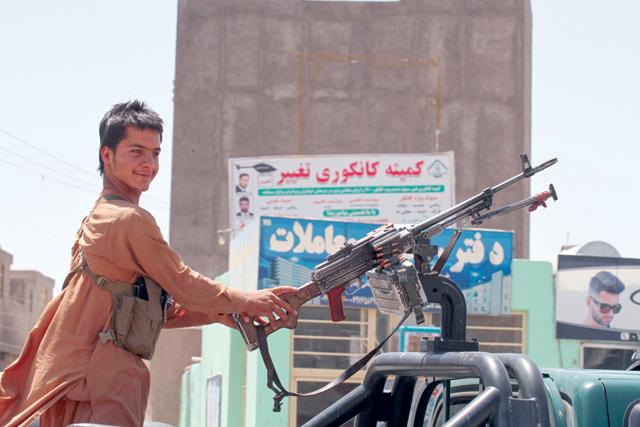
In this photo taken on Friday, an Afghan militiaman stands on a vehicle keeping a vigil along a road on the outskirts of Herat (AFP photo)
KABUL/GENEVA — The Taliban were in control of six Afghan provincial capitals on Tuesday after a blitz across the north forced tens of thousands of people to flee their homes for the relative safety of Kabul and other centres.
The insurgents now have their eyes on Mazar-i-Sharif, the north's biggest city, whose fall would signal the total collapse of government control in a region that has traditionally been anti-Taliban.
Government forces are also battling the hardline Islamists in Kandahar and Helmand, the southern Pashto-speaking provinces from where the Taliban draw their strength.
The United States, due to complete a troop withdrawal at the end of the month and end its longest war, has all but left the battlefield.
However, Washington's special envoy Zalmay Khalilzad is now in Qatar to try and convince the Taliban to accept a ceasefire.
Khalilzad "will press the Taliban to stop their military offensive", the State Department said, and "help formulate a joint international response to the rapidly deteriorating situation".
Envoys from hosts Qatar, Britain, China, Pakistan, Uzbekistan, the United Nations, and European Union were also due to discuss the situation in Afghanistan, a source told AFP.
But even with a new round of talks in the works, Pentagon spokesman John Kirby said it was down to the Afghan government and its forces to turn the tide, and there was “not much” the United States could do to help.
Michael Kugelman, at the Woodrow Wilson International Centre for Scholars, doubted Washington had the means to change anything.
“I fear that the Taliban [are] just so strong and the Afghan military is so beleaguered right now, it’s going to be hard to find some type of momentum-changer from the US,” he said.
Brutal treatment
The Taliban have appeared largely indifferent to peace overtures, and seem intent on a military victory to crown a return to power after their ouster 20 years ago in the wake of the September 11 attacks.
As fighting raged, tens of thousands of people were on the move inside the country, with families fleeing newly captured Taliban cities with tales of brutal treatment at the hands of the insurgents.
“The Taliban are beating and looting,” said Rahima, now camped out with hundreds of families at a park in the capital, Kabul, after fleeing Sheberghan province.
“If there is a young girl or a widow in a family, they forcibly take them. We fled to protect our honour.”
“We are so exhausted,” added Farid, an evacuee from Kunduz who did not want to be further identified.
In the northern city of Kunduz that was captured by the Taliban over the weekend, residents said shops had begun to reopen in the centre as insurgents focused their attention on government forces who had retreated to the airport.
“People are opening their shops and businesses, but you can still see fear in their eyes,” said shopkeeper Habibullah.
Another resident, living close to the airport, reported days of heavy fighting for days.
“The Taliban are hiding in people’s houses in the area and government forces are bombing them,” said Haseeb, who only gave his first name.
‘Great success’
The Taliban earned notoriety during their first stint in power from 1996-2001 for introducing a harsh interpretation of Islamic rule that barred girls from education and women from work.
Crimes were punished by public floggings or executions, while a host of activities, from playing music to non-religious TV, were also banned.
Following the capture of Aibak on Monday, the insurgents have now overrun five provincial capitals in the north. They have also taken Zaranj, the capital of Nimroz province, in the southwest.
On Tuesday, the Taliban reiterated they were closing in on Mazar-i-Sharif — the largest city in the north and a linchpin for the government’s control of the region — after capturing Sheberghan to its west, and Kunduz and Taloqan to its east.
But Fawad Aman, spokesman for the ministry of defence, said Afghan forces had the upper hand there.
“Great success”, he tweeted.
The Indian consulate in Mazar, however, called on its nationals to board a “special flight” scheduled for later in the day.
From Geneva, UN High Commissioner for Human Rights Michelle Bachelet said her office was receiving reports of possible war crimes.
“The Taliban must cease their military operations in cities. Unless all parties return to the negotiating table and reach a peaceful settlement, the already atrocious situation for so many Afghans will become much worse,” Bachelet said in a statement.
“We know that urban warfare results in scores of civilians being killed. We have seen it before, too many times.”
“In Afghanistan, since 9 July in four cities alone — Lashkar Gah, Kandahar, Herat and Kunduz — at least 183 civilians have been killed and 1,181 injured, including children,” she said, adding that these were just the civilian casualties the UN had managed to document.
“The real figures will be much higher.”
Related Articles
MAZAR-I-SHARIF, Afghanistan — Afghan President Ashraf Ghani returned to the capital on Wednesday after a flying visit to the besieged northe
MAZAR-I-SHARIF, Afghanistan — The Taliban seized a sixth Afghan provincial capital on Monday following a weekend blitz across the north that
KABUL — The Taliban seized the stronghold of a notorious Afghan warlord on Saturday, officials said, the second provincial capital to fall t


